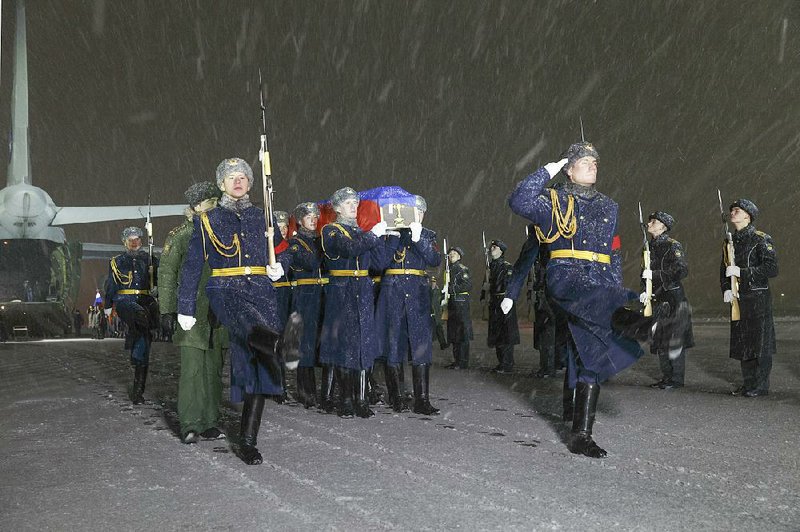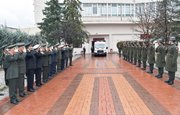Turkey said Monday that it won't apologize to Russia for shooting down a warplane, stressing that the military was doing its job defending the country's airspace, while Russia expanded trade restrictions against Turkey and warned that the measures may be only the first stage of its retaliation.
Meanwhile, Britain Prime Minister David Cameron called for a debate and vote in Parliament on Wednesday on whether Britain should launch airstrikes against militants in Syria, arguing that the nation must stand with its allies in confronting extremism.
Imports of fruit and vegetables from Turkey will be banned by Russia, and cargo permits for Turkish trucking companies will be cut from 8,000 to 2,000, with a possible reduction to zero, Deputy Prime Minister Arkady Dvorkovich told a government meeting in Moscow on Monday. Shipments arriving at ports will be subject to increased controls, First Deputy Prime Minister Igor Shuvalov said at the meeting.
"The Turkish prime minister hopes that Russia will rethink the issue of retaliatory measures relating to the incident with our downed plane," Russian Premier Dmitry Medvedev said. "And at the same time he says that Turkey will never apologize for the incident. No comment is needed."
Ahmet Davutoglu, Turkey's prime minister, said he hopes Moscow will reconsider economic sanctions announced against Turkish interests. The Turkish resort town of Antalya is "like a second home" to many Russian vacationers, he said.
But Davutoglu refused to yield on the security matter. "No Turkish prime minister or president will apologize ... because of doing our duty," he told reporters after meeting with NATO Secretary-General Jens Stoltenberg in Brussels.
"Protection of Turkish airspace, Turkish borders is a national duty, and our army did their job to protect this airspace. But if the Russian side wants to talk, and wants to prevent any future unintentional events like this, we are ready to talk."
The penalties add to sanctions announced by President Vladimir Putin on Saturday after Turkish jets shot down the Russian warplane last week, the most serious clash between Russia and a member of NATO since the Cold War. The confrontation has complicated French efforts to form an alliance with Russia and the U.S. to fight the Islamic State group in Syria after the terrorist attacks in Paris Nov. 13 that killed 130 people.
On Monday, the body of Lt. Col. Oleg Peshkov, the Russian pilot, was flown back to Russia after a military ceremony in the Turkish capital, Ankara, Turkey's military said.
Putin, at the international climate talks in Paris, on Monday said "we have every reason to believe" that the plane was shot down to protect what he described as Turkish profiteering from illegal imports of oil produced by Islamic State rebels in Syria.
The Russian air force said Monday that its Su-34 fighter bombers in Syria were now armed with air-to-air missiles for defense. Air force spokesman Col. Igor Klimov said the missiles have a range of about 35 miles, Russian news agencies reported.
Russia began airstrikes in Syria on Sept. 30 that it says are focused on Islamic State fighters. But some observers say Russia is targeting other rebel groups to bolster the forces of Syrian President Bashar Assad. Russia insists that the plane that was shot down didn't intrude on Turkish airspace.
Douglas Lute, the U.S. ambassador to NATO, said he saw American data which "corroborates Turkey's version of events. So the airplane was in Turkey, it was engaged in Turkey."
Putin on Saturday called for sanctions against Turkey including bans on some Turkish goods and extensions on work contracts for Turks working in Russia. The measures also call for ending chartered flights from Russia to Turkey and for Russian tourism companies to stop selling vacation packages that would include a stay in Turkey.
Russia may expand the list of restrictions against Turkey, Medvedev told his deputies. Turkish business representatives "are being held hostage by Turkish leaders," he said.
The ban on fruits and vegetables will take effect in a few weeks to give customers time to adjust and ensure that prices don't surge, Dvorkovich said.
Cameron confident
Cameron's call Monday for Parliament to vote comes only hours after opposition leader Jeremy Corbyn decided that Labor Party lawmakers would be allowed to vote their conscience on the matter -- rather than to keep party discipline and have a unified stance.
The move by the Labor leader gave Cameron confidence he had the votes to clinch an expansion of the mandate of British forces to hit Islamic State group militants not just in Iraq, but Syria as well.
Cameron has repeatedly said he wouldn't take the matter to Parliament unless he could be certain of victory, worried that Britain's prestige would be at risk. If the measure is approved in Parliament, British military operations are expected to start shortly afterward.
Britain's Royal Air Force is already part of a U.S.-led campaign against the militants in Iraq, and the question before lawmakers would be whether the mandate for the strikes should be expanded to Syria. Cameron has said, "we have to hit these terrorists in their heartlands," and argued that it made no sense to stop at borders that were ignored by the militants.
The U.N. Security Council called last week for nations to unite against the extremists after the attacks in Paris and the downing of a Russian civilian airliner over Egypt's Sinai Desert. The Islamic State group has claimed responsibility for those and other recent attacks.
Obama, Putin meet
In Paris, Putin talked of an understanding with U.S. President Barack Obama on the fight against the Islamic State.
The two leaders met on the sidelines of the international climate change summit being held on the outskirts of the French capital, in Le Bourget.
The resolve to unite will be further tested by a meeting of NATO foreign ministers today that takes place after the Brussels-based military alliance backed Turkey's version of events leading to last week's downing of a Russian warplane and said it would further upgrade Turkey's air defenses.
Paris, which was attacked by terrorists last month, is testing how serious government leaders are about putting aside ideological differences, personal animosities and recent grievances. Putin painted a rosier picture of his huddle with Obama than the White House and laid into Turkish leader Recep Tayyip Erdogan over the downing of the Russian jet.
After 30 minutes, Putin emerged from his meeting with Obama to say "there is an understanding of where we should move" with regards to joint action in Syria and a list of terrorist targets. Ben Rhodes, Obama's deputy national security adviser, countered that the president stressed how Assad, a Russian ally, cannot stay in power and that Russian aerial attacks are still targeting legitimate opposition members.
Putin was unequivocal about the chances of collaboration with Turkey.
"This bomber was shot down by Turkey's military. What kind of broad coalition can we talk about?" Putin said in Paris, where Erdogan had requested a one-on-one meeting with Putin. The deterioration of ties with Turkey is "a shame for us all" and "a great pity for me personally, because I've done a lot to develop these relations."
Kremlin spokesman Dmitry Peskov told reporters Monday that a meeting with Erdogan wasn't on Putin's schedule.
Obama will be meeting with Erdogan today.
Meanwhile, NATO said it will further upgrade Turkey's air defenses.
Allied military planners will recommend ways of bolstering the protection of Turkey, which has already drawn on Patriot missiles supplied by NATO countries, Stoltenberg said.
"We will continue to augment their air defenses," Stoltenberg told reporters in Brussels. "Exactly with what kind of capabilities is what our military authorities are now assessing. They will provide us with some recommendations."
Stoltenberg backed Turkey's version of the Nov. 24 downing and urged Russia to join NATO in an early warning system to prevent similar confrontations.
French President Francois Hollande last month jetted between Moscow and Washington in a bid to ratchet support for a grand coalition against the Islamic State group. As more than 140 world leaders converged on Paris, he was hoping as host to convert many sympathetic pledges of cooperation into success against Islamic State on the battlefield.
That is proving to be problematic after Turkey's actions.
Hollande and Egyptian President Abdel-Fattah El-Sisi agreed Monday on the "absolute necessity" to combat Islamic State everywhere, as well as the need for a political transition in Syria and a national unity government in Libya "as soon as possible," Hollande's office said.
Rival militants battle
In Syria, fighting between U.S.-backed Syrian rebels and rival militants has killed more than 20 people in northern Syria over the past two days, opposition activists said Monday.
The fighting between the Kurdish-led so-called Democratic Forces of Syria and other militants has flared in recent days in the northern province of Aleppo. Most of the fighting has taken place in the border area, where Turkey is examining the possibility of creating a safe zone to protect civilians and moderate rebels fighting Assad's forces.
The Britain-based Syrian Observatory for Human Rights said the fighting is concentrated near the town of Azaz, close to the border with Turkey. Azaz has been repeatedly hit by Russian airstrikes in recent days.
The Observatory, which tracks Syria's civil war on the basis of reports from activists inside the country, said 15 militants and eight Democratic Forces of Syria fighters have been killed since Sunday.
Bahaa al-Halaby, an opposition activist based in Aleppo, said Monday that 20 civilians were killed in the fighting but did not have figures for fighters killed. He said the fighting began when Democratic Forces of Syria launched an offensive and captured several villages before being pushed back by militants.
The Observatory said on Monday that two months of Russian airstrikes have killed 1,502 people including 485 civilians. The group said that 419 Islamic State fighters and 598 gunmen with other militant groups, including al-Qaida's affiliate in Syria, the Nusra Front, were killed in the air campaign.
Also on Monday, the Observatory reported that Islamic State fighters shot dead 18 soldiers and pro-government gunmen in a public square in the historic town of Palmyra. It said the 18 fighters had been captured in previous battles with the extremist group.
Information for this article was contributed by Jamey Keaten, Suzan Fraser, Bassem Mroue, Danica Kirka and Gregory Katz of The Associated Press; and by Andrey Biryukov, James G. Neuger, Ilya Arkhipov, Justin Sink, Patrick Donahue, Alexei Anishchuk, Helene Fouquet, Gregory Viscusi, Ian Wishart and Mike Dorning of Bloomberg News.
A Section on 12/01/2015

